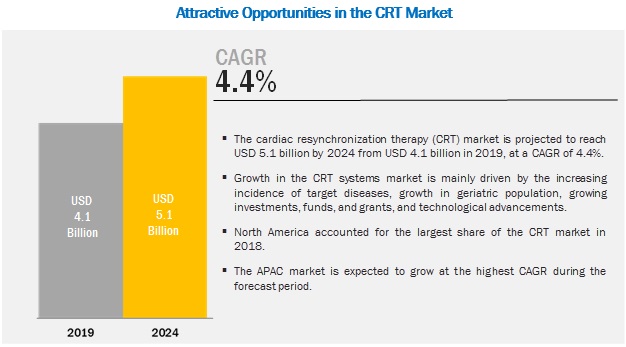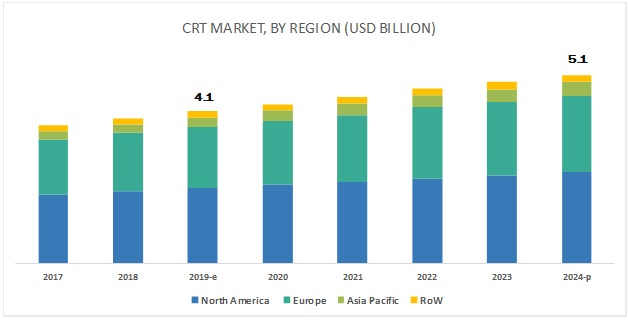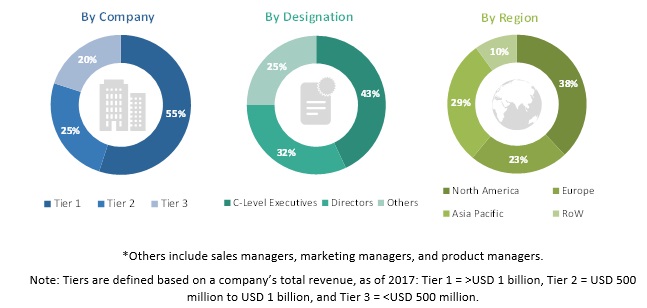Cardiac Resynchronization Therapy Market by Product Type (Cardiac Resynchronization Therapy Defibrillator and Cardiac Resynchronization Therapy Pacemaker), End User (Hospitals & Cardiac Centers and Ambulatory Surgery Centers) & Region - Global Forecasts to 2024
The cardiac resynchronization therapy market is projected to reach USD 5.1 billion by 2024, at a CAGR of 4.4%. The growth of the market is majorly driven by the increasing incidence of target diseases (primarily due to the rising geriatric population). Rising investments and support, along with technological advancements, are also contributing to the growth of this market.

The CRT-Ds segment accounted for the largest share of the CRT market
On the basis of product type, the global market is segmented into cardiac resynchronization therapy Defibrillators(CRT-Ds) and cardiac resynchronization therapy Pacemakers(CRT-Ps). The CRT-Ds segment accounted for the largest share of the market in 2018. This is majorly attributed to the increasing acceptance of CRT-Ds over pacemakers and the launch of technologically advanced devices. Furthermore, growth in this market segment is largely driven by the increasing incidence of target diseases.
Hospitals & cardiac centers accounted for the largest share of the cardiac resynchronization therapy market
On the basis of end user, the market is segmented into hospitals & cardiac centers and ambulatory surgery centers. Hospitals & cardiac centers accounted for the largest share of the market in 2018. The increasing prevalence of CVD, rising number of surgical procedures performed, favorable reimbursement scenario, and the increasing number of critical care and intensive care units are some of the key factors driving the growth of the hospitals & cardiac centers segment.

The APAC market is expected to grow at the highest CAGR during the forecast period
The Asia Pacific region is projected to register the highest growth rate in the global market during the forecast period. Favorable reimbursement scenario in Japan, the rising geriatric population in China, rising incidence of CVDs, improving healthcare infrastructure, growing middle-class population, and rising disposable income levels in India are some of the key factors driving the growth of the cardiac resynchronization therapy market in the Asia Pacific.
Prominent players in the cardiac resynchronization therapy market are Medtronic (Ireland), Abbott (US), Boston Scientific Corporation (US), MicroPort Scientific Corporation (China), BIOTRONIK (Germany), and Medico S.p.A. (Italy).
Medtronic is a medical technology company that manufactures, designs, develops, and markets a wide range of solutions and medical devices used in the treatment of cardiac, spinal, neurological, vascular, and chronic conditions. The company is one of the major players in the CRT systems market. With a strong brand name and wide geographic coverage in more than 160 countries, Medtronic has a well-established presence in this market. As a part of its global growth strategy, the company pursues organic growth strategies, such as product approvals. The company is also investing a large sum into its expansion projects to increase its global presence. In this regard, the company opened its Asia Pacific headquarters in Singapore to support operations at 80 locations in this region.
Scope of the Cardiac Resynchronization Therapy Market Report:
|
Report Metric |
Details |
|
Market size available for years |
2017–2024 |
|
Base year considered |
2018 |
|
Forecast period |
2019–2024 |
|
Forecast units |
Value (USD) |
|
Segments covered |
Product Type, End User, and Region |
|
Geographies covered |
North America, Europe, Asia Pacific, and the Rest of World |
|
Companies covered |
Medtronic (Ireland), Abbott Laboratories (US), Boston Scientific (US), Biotronik (Germany), MicroPort Scientific Corporation (China), and Medico S.p.A (Italy) |
The research report categorizes the cardiac resynchronization therapy market into the following segments and subsegments:
By Product Type
- Cardiac Resynchronization Therapy Defibrillators
- Cardiac Resynchronization Therapy Pacemakers
By End User
- Hospitals & Cardiac Centers
- Ambulatory Surgery Centers
By Region
-
North America
- US
- Canada
-
Europe
- Germany
- UK
- France
- Italy
- Rest of Europe
-
Asia Pacific
- China
- Japan
- India
- Rest of Asia Pacific
- Rest of the World
Recent Developments
- In 2017, the company received the US FDA approval for its quadripolar cardiac resynchronization therapy pacemakers (CRT-Ps), which improve therapy delivery for patients with heart failure.
- In 2017, the company also received the CE mark approval for a suite of quadripolar cardiac resynchronization therapy pacemakers (CRT-Ps).
Critical questions answered in the report:
- How will the current technological trends affect the cardiac resynchronization therapy market in the long term?
- How is the CRT- pacemakers market growing?
- Which regions are likely to grow at the highest CAGR?
- What are the challenges hindering the adoption of CRT devices?
- What are the growth strategies being implemented by major market players?
To speak to our analyst for a discussion on the above findings, click Speak to Analyst

Table of Contents
1 Introduction (Page No. - 12)
1.1 Objectives of the Study
1.2 Market Definition
1.3 Market Scope
1.3.1 Markets Covered
1.3.2 Years Considered for the Study
1.4 Currency
1.5 Limitations
1.6 Stakeholders
2 Research Methodology (Page No. - 15)
2.1 Research Data
2.1.1 Secondary Data
2.1.1.1 Key Data From Secondary Sources
2.1.2 Primary Data
2.1.2.1 Key Data From Primary Sources
2.1.2.2 Key Industry Insights
2.2 Market Size Estimation
2.2.1 Market Data Validation and Triangulation
2.3 Assumptions for the Study
3 Executive Summary (Page No. - 24)
4 Premium Insights (Page No. - 27)
4.1 Cardiac Resynchronization Therapy Systems Market Overview
4.2 North America: Cardiac Resynchronization Therapy Systems Market, By Type, 2018
4.3 Europe: Cardiac Resynchronization Therapy Systems Market, By Type, 2018
4.4 Cardiac Resynchronization Therapy Systems Market: Geographic Snapshot
5 Market Overview (Page No. - 31)
5.1 Introduction
5.2 Market Dynamics
5.2.1 Drivers
5.2.1.1 Increasing Incidence of Target Diseases
5.2.1.2 Growth in the Geriatric Population
5.2.1.3 Growing Investments, Funds, and Grants
5.2.1.4 Technological Advancements
5.2.1.5 Mri-Safe Device Technology
5.2.1.6 Wireless CRT
5.2.2 Restraints
5.2.2.1 Unfavorable Healthcare Reforms in the Us
5.2.3 Opportunities
5.2.3.1 Emerging Markets
5.2.4 Challenges
5.2.4.1 Shortage of Skilled Cardiac Surgeons
5.2.4.2 Product Recalls
5.2.4.3 Battery Life and Device Replacement Cost
6 Cardiac Resynchronization Therapy Market, By Type (Page No. - 38)
6.1 Introduction
6.2 Cardiac Resynchronization Therapy Defibrillators
6.2.1 CRT - Defibrillators Accounted for the Largest Share of the CRT Systems Market in 2018
6.3 Cardiac Resynchronization Therapy Pacemakers
6.3.1 The CRT - Pacemakers Market Will Grow at the Highest CAGR During the Forecast Period
7 Cardiac Resynchronization Therapy Market, By End User (Page No. - 43)
7.1 Introduction
7.2 Hospitals & Cardiac Centers
7.2.1 Hospital & Cardiac Centers to Dominate the End-User Market
7.3 Ambulatory Surgery Centers
7.3.1 Increasing Number of Centers in the US to Drive the Adoption of CRT Devices
8 Cardiac Resynchronization Therapy Market, By Region (Page No. - 47)
8.1 Introduction
8.2 North America
8.2.1 US
8.2.1.1 Technological Advancements—A Key Factor Driving Market Growth
8.2.2 Canada
8.2.2.1 Growing Focus of Government and Private Organizations on Providing Research Funding is Expected to Drive the Market in Canada
8.3 Europe
8.3.1 Germany
8.3.1.1 Favorable Healthcare Expenditure and Growing Use of CRT Devices to Drive Market Growth
8.3.2 UK
8.3.2.1 Increasing Geriatric Population and Increasing Use of CRT Devices to Drive Market Growth
8.3.3 France
8.3.3.1 Growing Use of Cardiac Resynchronization Therapy Devices for Heart Failure to Support Market Growth
8.3.4 Italy
8.3.4.1 Increasing Incidence of CVDS to Drive the Adoption of Cardiac Resynchronization Therapy Devices in the Country
8.3.5 Rest of Europe
8.4 Asia Pacific
8.4.1 Japan
8.4.1.1 Favourable Reimbursement Policy to Support Market Growth
8.4.2 China
8.4.2.1 Growing Geriatric Population to Drive the Market for Cardiac Resynchronization Therapy Systems
8.4.3 India
8.4.3.1 Growing Middle-Class Population & Rising Disposable Income Levels are Supporting the Growth of the CRT Systems Market in India
8.4.4 Rest of Asia Pacific
8.5 Rest of the World
9 Competitive Landscape (Page No. - 82)
9.1 Overview
9.2 Market Share Analysis
9.2.1 Medtronic
9.2.2 Abbott Laboratories
9.2.3 Boston Scientific Corporation
9.3 Competitive Scenario
9.3.1 Product Launches and Approvals
9.3.2 Expansions
9.3.3 Acquisitions, 2017 - 2018
10 Company Profiles (Page No. - 86)
(Business Overview, Products Offered, Recent Developments, and MnM View)*
10.1 Medtronic, PLC.
10.2 Abbott Laboratories
10.3 Boston Scientific Corporation
10.4 Biotronik
10.5 Medico S.P.A.
10.6 Microport Scientific Corporation
* Business Overview, Products Offered, Recent Developments, and MnM View Might Not Be Captured in Case of Unlisted Companies.
11 Appendix (Page No. - 100)
11.1 Discussion Guide
11.2 Knowledge Store: Marketsandmarkets’ Subscription Portal
11.3 Available Customizations
11.4 Related Reports
11.5 Author Details
List of Tables (59 Tables)
Table 1 Population Statistics, 2015 vs 2030 vs 2050 (Million Individuals)
Table 2 List of Product Recalls
Table 3 Battery Survival Rate By Device Manufacturer
Table 4 CRT System Market, By Type, 2017–2024 (USD Million)
Table 5 Cardiac Resynchronization Therapy Defibrillators Market, By Region, 2017–2024 (USD Million)
Table 6 Cardiac Resynchronization Therapy Defibrillators Market, By Region, 2017–2024 (Units)
Table 7 Cardiac Resynchronization Therapy Pacemakers Market, By Region, 2017–2024 (USD Million)
Table 8 Cardiac Resynchronization Therapy Pacemakers Market, By Region, 2017–2024 (Units)
Table 9 CRT System Market, By End User, 2017–2024 (USD Million)
Table 10 CRT System Market for Hospitals & Cardiac Centers, By Region, 2017–2024 (USD Million)
Table 11 CRT System Market for Ambulatory Surgery Centers, By Region, 2017–2024 (USD Million)
Table 12 CRT System Market, By Region, 2017–2024 (USD Million)
Table 13 CRT System Market, By Region, 2017–2024 (Units)
Table 14 North America: CRT System Market, By Country, 2017–2024 (USD Million)
Table 15 North America: CRT System Market, By Type, 2017–2024 (USD Million)
Table 16 North America: Cardiac Resynchronization Therapy Defibrillators Market, By Country, 2017–2024 (USD Million)
Table 17 North America: Cardiac Resynchronization Therapy Pacemakers Market, By Country, 2017–2024 (USD Million)
Table 18 North America: CRT System Market, By End User, 2017–2024 (USD Million)
Table 19 Clinical Trials Related to Cardiac Resynchronization Therapy Devices
Table 20 US: CRT System Market, By Type, 2017–2024 (USD Million)
Table 21 US: CRT System Market, By End User, 2017–2024 (USD Million)
Table 22 Canada: CRT System Market, By Type, 2017–2024 (USD Million)
Table 23 Canada: CRT System Market, By End User, 2017–2024 (USD Million)
Table 24 Europe: CRT System Market, By Country, 2017–2024 (USD Million)
Table 25 Europe: CRT System Market, By Type, 2017–2024 (USD Million)
Table 26 Europe: Cardiac Resynchronization Therapy Defibrillators Market, By Country, 2017–2024 (USD Million)
Table 27 Europe: Cardiac Resynchronization Therapy Pacemakers Market, By Country, 2017–2024 (USD Million)
Table 28 Europe: CRT System Market, By End User, 2017–2024 (USD Million)
Table 29 Germany: CRT System Market, By Type, 2017–2024 (USD Million)
Table 30 Germany: CRT System Market, By End User, 2017–2024 (USD Million)
Table 31 Research Studies Related to CRT Devices in the UK
Table 32 UK: CRT System Market, By Type, 2017–2024 (USD Million)
Table 33 UK: CRT System Market, By End User, 2017–2024 (USD Million)
Table 34 France: CRT System Market, By Type, 2017–2024 (USD Million)
Table 35 France: CRT System Market, By End User, 2017–2024 (USD Million)
Table 36 Italy: CRT System Market, By Type, 2017–2024 (USD Million)
Table 37 Italy: CRT System Market, By End User, 2017–2024 (USD Million)
Table 38 Cardiac Resynchronization Therapy Units Implanted, By Country
Table 39 RoE: CRT System Market, By Type, 2017–2024 (USD Million)
Table 40 RoE: CRT System Market, By End User, 2017–2024 (USD Million)
Table 41 Asia Pacific: CRT System Market, By Country, 2017–2024 (USD Million)
Table 42 Asia Pacific: CRT System Market, By Type, 2017–2024 (USD Million)
Table 43 Asia Pacific: Cardiac Resynchronization Therapy Defibrillators Market, By Country, 2017–2024 (USD Million)
Table 44 Asia Pacific: Cardiac Resynchronization Therapy Pacemakers Market, By Country, 2017–2024 (USD Million)
Table 45 Asia Pacific: CRT System Market, By End User, 2017–2024 (USD Million)
Table 46 Japan: CRT System Market, By Type, 2017–2024 (USD Million)
Table 47 Japan: CRT System Market, By End User, 2017–2024 (USD Million)
Table 48 China: CRT System Market, By Type, 2017–2024 (USD Million)
Table 49 China: CRT System Market, By End User, 2017–2024 (USD Million)
Table 50 India: CRT System Market, By Type, 2017–2024 (USD Million)
Table 51 India: CRT System Market, By End User, 2017–2024 (USD Million)
Table 52 Cardiac Resynchronization Therapy Units Implanted, By Country
Table 53 RoAPAC: CRT System Market, By Type, 2017–2024 (USD Million)
Table 54 RoAPAC: CRT System Market, By End User, 2017–2024 (USD Million)
Table 55 Cardiac Resynchronization Therapy Units Implanted, By Country
Table 56 RoW: CRT System Market, By Type, 2017–2024 (USD Million)
Table 57 RoW: CRT System Market, By End User, 2017–2024 (USD Million)
Table 58 Product Launches and Approvals, 2017 - 2018
Table 59 Expansions, 2016
List of Figures (27 Figures)
Figure 1 CRT System Market Segmentation
Figure 2 CRT System Market: Research Methodology
Figure 3 Research Design
Figure 4 Breakdown of Primary Interviews: By Company Type, Designation, and Region
Figure 5 Market Size Estimation Methodology: Bottom-Up Approach
Figure 6 Market Size Estimation Methodology: Top-Down Approach
Figure 7 Data Triangulation Methodology
Figure 8 CRT System Market, By Type, 2018
Figure 9 CRT System Market, By End User, 2018
Figure 10 Geographic Snapshot: CRT System Market, 2018
Figure 11 Increasing Incidence Target Disease to Drive the Growth of the CRT Systems Market
Figure 12 Defibrillators to Dominate the North American Market During the Forecast Period
Figure 13 CRT - Defibrillators to Dominate the CRT Systems Market During the Forecast Period
Figure 14 Asia Pacific to Grow at the Highest CAGR During the Forecast Period
Figure 15 Cardiac Resynchronization Therapy Systems Market: Drivers, Restraints, Opportunities, & Challenges
Figure 16 Market, By Type, 2019 vs 2024 (USD Million)
Figure 17 Market, By End User, 2019 vs 2024 (USD Million)
Figure 18 Market, By Region, 2019 vs 2024
Figure 19 North America: Market Snapshot
Figure 20 Europe: Market Snapshot
Figure 21 Asia Pacific: Market Snapshot
Figure 22 RoW: Market Snapshot
Figure 23 Market Share Analysis By Key Players (2015–2018)
Figure 24 Medtronic, PLC: Company Snapshot (2017)
Figure 25 Abbott Laboratories: Company Snapshot (2018)
Figure 26 Boston Scientific: Company Snapshot (2017)
Figure 27 Microport Scientific Corporation: Company Snapshot (2017)
This study involved the extensive use of both primary and secondary sources. The research process involved the study of various factors affecting the industry to identify the segmentation types, industry trends, key players, competitive landscape, key market dynamics, and key player strategies.
Secondary Research
The secondary research process involves the widespread use of secondary sources, directories, databases (such as Bloomberg Businessweek, Factiva, and D&B Hoovers), white papers, annual reports, companies house documents, investor presentations, and SEC filings of companies. Secondary research was used to identify and collect information useful for the extensive, technical, market-oriented, and commercial study of the cardiac resynchronization therapy market. It was also used to obtain important information about the key players and market classification & segmentation according to industry trends to the bottom-most level, and key developments related to market and technology perspectives. A database of the key industry leaders was also prepared using secondary research.
Primary Research
In the primary research process, various sources from both the supply and demand sides were interviewed to obtain qualitative and quantitative information for this report. The primary sources from the supply side include industry experts such as CEOs, vice presidents, marketing and sales directors, technology & innovation directors, and related key executives from various key companies and organizations operating in the global market. The primary sources from the demand side included industry experts, such as researchers and scientists, and industry experts from pharmaceutical & biotechnology companies. Primary research was conducted to validate the market segmentation, identify key players in the market, and gather insights on key industry trends & key market dynamics.
A breakdown of the primary respondents is provided below:

To know about the assumptions considered for the study, download the pdf brochure
Market Size Estimation
The market size estimates and forecasts provided in this study are derived through a mix of the bottom-up approach (segmental analysis of major segments) and top-down approach (assessment of utilization/adoption/penetration trends, by product type, end user, and region).
Data Triangulation
After arriving at the market size, the cardiac resynchronization therapy market was divided into several segments and subsegments. To complete the overall market engineering process and arrive at the exact statistics for all segments & subsegments, the data triangulation and market breakdown procedures were employed, wherever applicable.
Objectives of the Study
- To define, describe, segment, and forecast the global cardiac resynchronization therapy market by product type, end user, and region.
- To provide detailed information about the factors influencing market growth (such as drivers, restraints, opportunities, and industry-specific challenges)
- To analyze micromarkets with respect to individual growth trends, prospects, and contributions to the overall market
- To analyze market opportunities for stakeholders and provide details of the competitive landscape for key players
- To forecast the size of the global market in five main regions along with their respective key countries (North America, Europe, Asia Pacific, the Rest of the World)
- To profile key players in the global market and comprehensively analyze their core competencies and market shares
- To track and analyze competitive developments such as acquisitions; product launches; expansions; collaborations, partnerships, & agreements; and R&D activities of the leading players in the global market
Available Customizations
With the given market data, MarketsandMarkets offers customizations as per the company’s specific needs. The following customization options are available for the report:
Geographic Analysis
- A further breakdown of the Rest of Asia Pacific market into South Korea, New Zealand, and other South East Asian countries
- A further breakdown of the European market into Spain, Belgium, the Netherlands, and the Rest of Europe



 Generating Response ...
Generating Response ...











Growth opportunities and latent adjacency in Cardiac Resynchronization Therapy Market